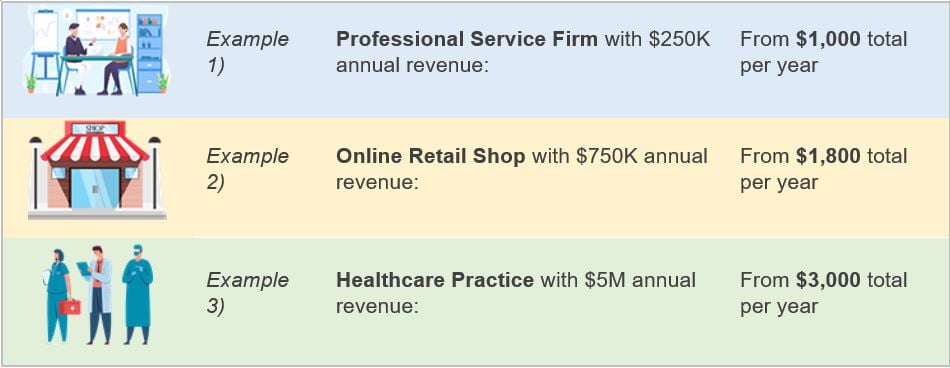Cyber threats are everywhere! And they are attacking small and medium-sized businesses like never before. Businesses that heavily rely on technology or data collection are at higher risk of cyberattacks, even with the protection of a reputable managed cyber security service provider. And if you’re not prepared enough, it will damage your business in more ways than one.
For starters, having a cyber security strategy is a must in any business. And if you don’t have one, you most likely do not have cyber insurance that will help you recover if ever you’re struck with a data breach.
Cyber insurance will help protect your business from cyber-related attacks and help you recoup your losses after a data breach.
In this article, we’ll discuss cyber insurance, how it works, and why it is so important.
What is cyber insurance?
Cyber Insurance is different to most other insurance policies because it is a package that contains several insurance policies in one. A common misconception is that it is only a liability policy, but it is much more than that.
In addition to Privacy and Security Liability cover (e.g., a privacy breach that causes financial loss to others), Cyber Insurance covers businesses for Business Interruption, Emergency Incident Response, Data and system Recovery, and Regulatory Fines and penalties arising from a cyber event. It can also protect businesses from cybercrime, like ransom payments and fraudulent payments an employee might make to a criminal pretending to be a service provider.
These sections are explained further in this article.

How cyber insurance protects your business
Any business that uses computers or systems (i.e., most businesses) is unfortunately at high risk of being the victim of a cyberattack that can shut down your business, lead to enormous costs or cause a lawsuit.
All organisations are being targeted by cybercriminals, from the largest multinational businesses and federal governments to SMBs and even sole traders. This is why cyber risk management is incredibly important, and insurance is an important piece to this puzzle.
Cyber insurance will help your business recover from extensive damages and costs caused by a breach, such as incident response costs, revenue loss, legal fees, operation disruptions, crisis management costs and PR expenses.
Here’s a list of ways that cyber insurance can protect your business before and after attacks:
- Firstly, the insurance policy will give you access to an emergency incident response team and forensic IT experts who will work together with your IT provider (like Office Solutions IT). These costs will be covered by the policy.
- A cyber-attack will inevitably cause an interruption to your business, which may lead to lost revenue and additional expenses, so you can continue operating as close to normal as possible. The policy will cover these costs while your IT teams are working to fix the issues.
- Costs to recover your data from back-ups and put your systems back to normal are covered, as well as forensic analysis to ensure the cybercriminals won’t still have access to your systems once operational again.
- If private information of third parties, such as personal information (can be as simple as a name and email address), is breached and leads to a lawsuit, your policy will cover your legal costs and potential settlements.
- In the case of a privacy breach, you will likely need to notify the OAIC as well as the individuals whose information was stolen. This can be costly and would be covered by the policy.
- And the last example is an important area that many people don’t think about, reputation damage. This is why most policies will cover you for PR expenses to help you communicate with your customers and weather the storm.
Please note that not all cyber insurance policies are the same, and you should speak with your insurance provider to ensure your policy includes cover for all of these important sections.
Why Risk Management is So Important
Although cyber insurance is important, it is only one part of a risk management strategy that your business should have. If a cyber attack happens, the impact on your business can be monumental and long-lasting, even if most of the costs are eventually covered by the insurer. It doesn’t bring back your customers’ trust that their data will be protected in the future.
Insurance can be a security blanket, but it is better to avoid an incident altogether, especially with something that can cause long-lasting reputation damage like a cyber-attack.
Your business must also implement risk mitigation strategies, such as the Essential Eight. Not only will this improve your cyber resilience, but it is often a minimum requirement to be eligible for an insurance policy, and can also help reduce premiums charged by insurers.
Common misconceptions about cyber insurance
Many businesses have a cyber strategy but are hesitant to get cyber insurance for various reasons. Let’s clear up some of those reasons below:
“My public liability policy is enough.”
Public liability insurance covers physical injuries and property damages from your services, products, or operations, but will usually exclude any financial loss from a data breach. It also won't include any of the important sections mentioned above, such as incident response, business interruption, breach recovery and cybercrime.
“My business is not big enough to be at risk.”
According to the ACSC, 62% of small businesses in Australia have undergone cybersecurity incidents in the past. And 60% of small businesses can’t recover from them and would close down within six months.
This statistic shows it’s not only large corporations that are targets for cyberattacks. Small and medium-sized businesses are more at risk of a data breach, considering their cyber security is not as established as large enterprises.
That’s why cyber insurance should be a part of your security strategy to protect your business from any of the liabilities that come with a data breach.
“Getting cyber insurance is too expensive!”
This misconception holds back many businesses from acquiring cyber insurance that would protect them during a cyber emergency. But it’s important to consider that your insurance cost will depend on the type of business and the possible cyber risks you have.
If you’re operating a small business, your cyber insurance cost would be substantially lower than that of a large corporation, considering the costs associated with a cyber event are likely much different.
To see how affordable Cyber Insurance can be, we have provided examples below from our insurance partner. Talk to OSIT to get a quote tailored to your business – it will only take 5 minutes through our online system from quote to purchase.

Indicative Pricing only, per annum inclusive of all fees and charges, subject to your answers and the terms and conditions of the policy.
“My risk management will prevent a breach from happening.”
Whilst risk management is extremely important, one click from an employee who doesn’t know better or is distracted by hundreds of daily tasks can bring it all crashing down.
Human error is the number one cause of cyber loss and can negate hundreds of thousands of dollars spent on building even the most secure risk management program.
It can be helpful to think about it this way: even though you lock your doors and install fire extinguishers, you know that there is a chance that the worst could happen, and you want to be protected on that day. It is no different from cyber risks.
“I keep all my data on the cloud and have backups.”
Simply put, a cyber breach can give criminals access to all of your data, including your back-ups, whether or not it is stored in the cloud:
- Backups are usually one of the first things cyber criminals target.
- If a breach occurs, you are not free from liability if the data is stored on the cloud. This does not mean it is your cloud provider's responsibility because it is your responsibility to keep this information secure.

Key takeaways
The number of cybercrime victims is growing, and it’s only a matter of time before your business becomes a target. That’s why you must have a cyber security solution that will have your back in times of emergencies.
But it is not all about prevention because these strategies can never be 100% effective. Sometimes, hackers can slip through the cracks, and Cyber Insurance can be the safety net.
For more information on cyber risk management or insurance, and to get an online cyber insurance quote, talk to us.
Frequently Asked Questions
What are the benefits of cyber insurance?
Cyber insurance, also known as cybersecurity insurance, is a specialised policy designed to protect organisations from the financial and operational setbacks resulting from a data breach or cyber attack. It serves as a safety net to cover substantial financial losses, such as data recovery costs, system repairs, business interruptions, and legal penalties. With cyber insurance, you can effectively manage the aftermath of a cyber incident, ensuring that your operations continue with minimal disruptions.
Is it worth having cyber insurance?
If your organisation handles sensitive customer data—such as personal, financial, or health-related information—and conducts a significant portion of its operations online, it is crucial to consider cyber insurance. This policy acts as a safety net to safeguard your organisation from the potentially devastating financial and reputational impacts of a cyber attack or data breach. With cyber insurance, you'll be better equipped to deal with the financial consequences of a cyber disaster and further protect your organisation’s operations and reputation.
How do I know if I need cyber insurance?
Determining whether you need cyber insurance requires a comprehensive analysis of your organisation's IT infrastructure, current vulnerabilities, and the likelihood of various cyber threats targeting your business. This assessment will help you evaluate the potential costs—both legal and otherwise—should you fall victim to a cyber attack, as well as what needs to be restored, mitigated, and prevented in the future.
What isn't covered by cyber insurance?
Cyber insurance is designed to cover immediate costs associated with a cyber incident, including data recovery, system repairs, and legal fees. However, it does not typically cover long-term financial impacts, such as lost revenue or customers due to diminished trust or loyalty.
Standard cyber insurance policies usually do not include coverage for the impact on market reputation or brand value. It’s advisable to have a conversation with your cyber insurance provider to clarify these matters.
While cyber insurance is essential for addressing specific expenses, it does have limitations, so you'll need to consider additional strategies in your cybersecurity solutions to protect against broader financial repercussions.
Which businesses need cyber insurance?
Cyber attacks in Australia are becoming increasingly frequent and severe. It is critical for businesses of all shapes, sizes, and industries to incorporate cyber insurance into their cybersecurity and risk management strategies to mitigate potentially devastating financial losses from various cyber incidents.
Ultimately, protecting your business against these threats means having the necessary resources to recover and maintain operations with minimal disruptions possible. Cyber insurance is not just about ensuring financial stability; it is also about maintaining business continuity in the face of cyber adversities.














